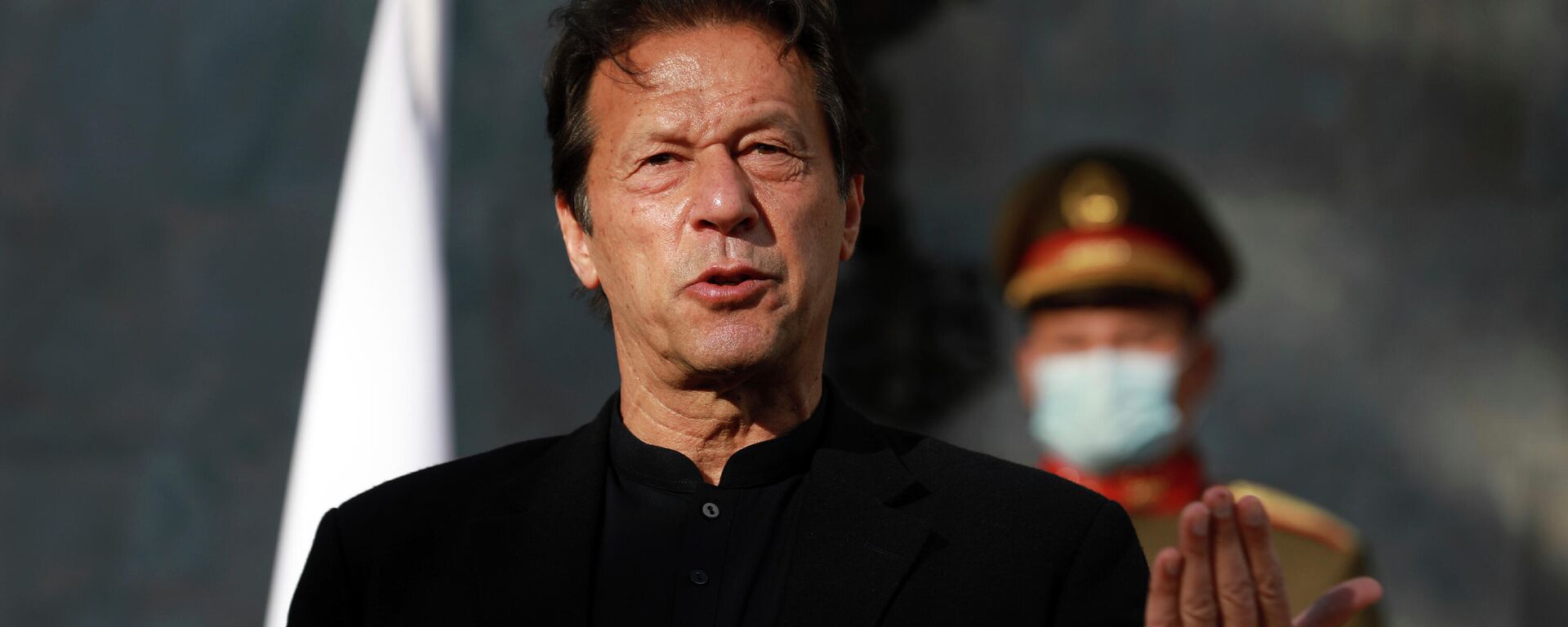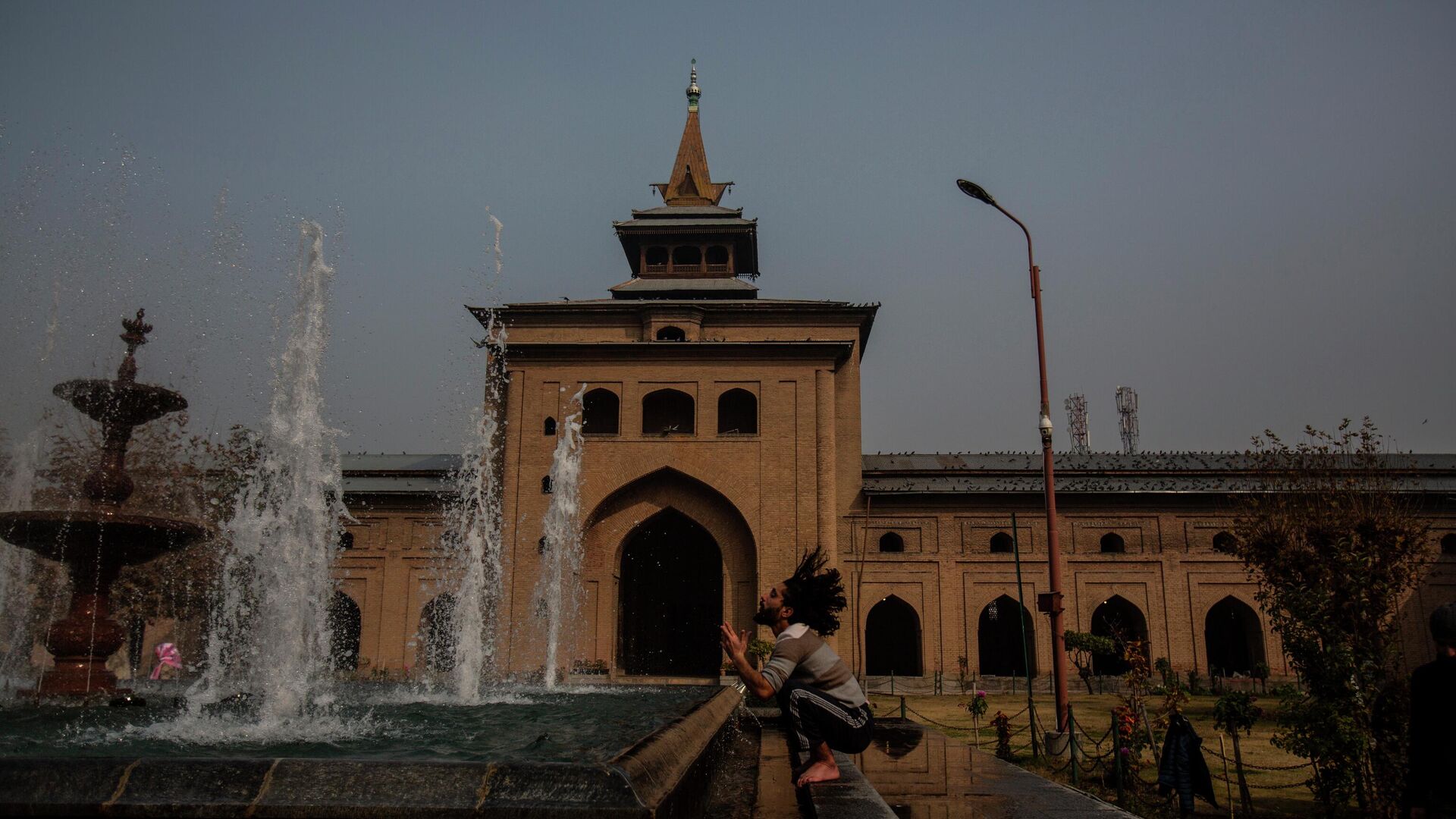https://sputnikglobe.com/20220409/freedom-slogans-in-kashmirs-biggest-mosque-after-friday-prayers-trigger-outrage-across-india-1094614148.html
'Freedom' Slogans in Kashmir's Biggest Mosque After Friday Prayers Trigger Outrage Across India
'Freedom' Slogans in Kashmir's Biggest Mosque After Friday Prayers Trigger Outrage Across India
Sputnik International
Manoj Sinha, the Lieutenant Governor of Jammu and Kashmir, said on Saturday that the security and paramilitary forces deployed in the Kashmir Valley were... 09.04.2022, Sputnik International
2022-04-09T14:17+0000
2022-04-09T14:17+0000
2022-12-08T18:02+0000
kashmir
ladakh standoff
muslims
imran khan
bharatiya janata party (bjp)
pakistan
https://cdn1.img.sputnikglobe.com/img/07e6/04/09/1094621975_0:160:3073:1888_1920x0_80_0_0_c2808acfa4108b62b6d4740e7a74620e.jpg
Many Indians have expressed concerns over an incident in Kashmir Valley on Friday, when scores of worshippers raised slogans calling for “freedom” from India after the prayers at Jamia Masjid, Kashmir’s biggest mosque.It was the first time in two years that mosque-goers congregated at Jamia Masjid for prayers during the holy month of Ramadan.P. Muralidhar Rao, a senior politician from India’s ruling Bharatiya Janata Party (BJP), described the sloganeering as a “wake-up call” for all Indians.“This is 2022 and we are talking about the present year. The government of India must come down heavily on these anti-national elements to set an example. It's high time that the government acted firmly,” another social media user wrote.Thousands of Hindus in Kashmir had reportedly fled from the Valley in January 1990 after threats from Islamist groups. According to several accounts, the Islamists back then used to deliver incendiary speeches against the Hindu residents at mosques, in order to incite ordinary Muslims.Hundreds of Hindus are also believed to have been killed by radical Islamist mobs during those days.Kashmir Police Make ArrestsMeanwhile, Kashmir Police said on Saturday that 13 people have been arrested over the sloganeering, as per a statement.The police have charged the arrested people under Sections 447 (criminal trespassing) and 124-A (sedition) of the Indian Penal Code (IPC).Giving an account of the happenings on Friday, a police official told reporters that only a few dozen people had raised the “provocative” and “anti-national” slogans, as per a report in the local publication Rising Kashmir.Police estimate that nearly 24,000 worshippers attended the prayers.It said that other congregants and mosque volunteers tried to disrupt the sloganeering, leading to clashes inside the house of worship.Further, cops have alleged that the accused had “received” instructions from “Pakistani handlers”, which they say was part of a “well-planned conspiracy” to disrupt the prayers at Jamia Masjid.Further, a police official has also warned that “any attempt at disrupting peace will be viewed very seriously” by the authorities.The erstwhile state of Jammu and Kashmir was stripped of its semi-autonomous status in a parliamentary vote in August 2019 and bifurcated into two federal territories—Jammu and Kashmir and Ladakh.The Indian government’s decision has been rejected by Pakistan, which controls a part of Jammu and Kashmir and has long disputed New Delhi’s political control over the region.Fearing protests from local politicians and Kashmir’s predominantly Muslim population, New Delhi also imposed a sweeping communications ban in the region. It was only in February 2021 that New Delhi ordered the resumption of 4G telecom services, which had been offline since August 2019.Pakistan Prime Minister Imran Khan downgraded diplomatic and commercial ties with India over its decision in August 2019, and has since maintained that he won’t hold any negotiations with Delhi till it reverses its moves.
https://sputnikglobe.com/20220205/grave-human-rights-violation-in-jk-pakistans-pm-accuses-india-on-kashmir-solidarity-day-1092767410.html
kashmir
ladakh standoff
pakistan
Sputnik International
feedback@sputniknews.com
+74956456601
MIA „Rosiya Segodnya“
2022
News
en_EN
Sputnik International
feedback@sputniknews.com
+74956456601
MIA „Rosiya Segodnya“
Sputnik International
feedback@sputniknews.com
+74956456601
MIA „Rosiya Segodnya“
kashmir, ladakh standoff, muslims, imran khan, bharatiya janata party (bjp), pakistan
kashmir, ladakh standoff, muslims, imran khan, bharatiya janata party (bjp), pakistan
'Freedom' Slogans in Kashmir's Biggest Mosque After Friday Prayers Trigger Outrage Across India
14:17 GMT 09.04.2022 (Updated: 18:02 GMT 08.12.2022) Manoj Sinha, the Lieutenant Governor of Jammu and Kashmir, said on Saturday that the security and paramilitary forces deployed in the Kashmir Valley were “vigilant” and called for keeping all religious shrines “safe” from criminals.
Many Indians have expressed concerns over an incident in Kashmir Valley on Friday, when scores of worshippers raised slogans calling for “freedom” from India after the prayers at Jamia Masjid, Kashmir’s biggest mosque.
It was the first time in two years that mosque-goers congregated at Jamia Masjid for prayers during the holy month of Ramadan.
P. Muralidhar Rao, a senior politician from India’s ruling Bharatiya Janata Party (BJP), described the sloganeering as a “wake-up call” for all Indians.
“Unequivocal condemnation and stern action is the need of the hour!” Rao wrote on Twitter.
“This is 2022 and we are talking about the present year. The government of India must come down heavily on these anti-national elements to set an example. It's high time that the government acted firmly,” another
social media user wrote.
“Srinagar mosque. Not on January 19, 1990 but today,” remarked Anand Ranganathan, a noted TV panellist and political author.
Thousands of Hindus in Kashmir had
reportedly fled from the Valley in January 1990 after threats from Islamist groups. According to several accounts, the Islamists back then used to deliver incendiary speeches against the Hindu residents at mosques, in order to incite ordinary Muslims.
Hundreds of Hindus are also believed to have been killed by radical Islamist mobs during those days.
Kashmir Police Make Arrests
Meanwhile, Kashmir Police said on Saturday that
13 people have been arrested over the sloganeering, as per a statement.
The police have charged the arrested people under Sections 447 (criminal trespassing) and 124-A (sedition) of the Indian Penal Code (IPC).
Giving an account of the happenings on Friday, a police official told reporters that only a few dozen people had raised the “provocative” and “anti-national” slogans, as per a report in the local publication
Rising Kashmir.
Police estimate that nearly 24,000 worshippers attended the prayers.
It said that other congregants and mosque volunteers tried to disrupt the sloganeering, leading to clashes inside the house of worship.
Further, cops have alleged that the accused had “received” instructions from “Pakistani handlers”, which they say was part of a “well-planned conspiracy” to disrupt the prayers at Jamia Masjid.
Further, a police official has also warned that “any attempt at disrupting peace will be viewed very seriously” by the authorities.

5 February 2022, 06:08 GMT
The erstwhile state of Jammu and Kashmir was stripped of its semi-autonomous status in a parliamentary vote in August 2019 and bifurcated into two federal territories—Jammu and Kashmir and Ladakh.
The Indian government’s decision has been rejected by Pakistan, which controls a part of Jammu and Kashmir and has long disputed New Delhi’s political control over the region.
Fearing protests from local politicians and Kashmir’s predominantly Muslim population, New Delhi also imposed a sweeping communications ban in the region. It was only in February 2021 that New Delhi ordered the
resumption of 4G telecom services, which had been offline since August 2019.
Pakistan Prime Minister Imran Khan downgraded diplomatic and commercial ties with India over its decision in August 2019, and has since maintained that he won’t hold any negotiations with Delhi till it reverses its moves.




